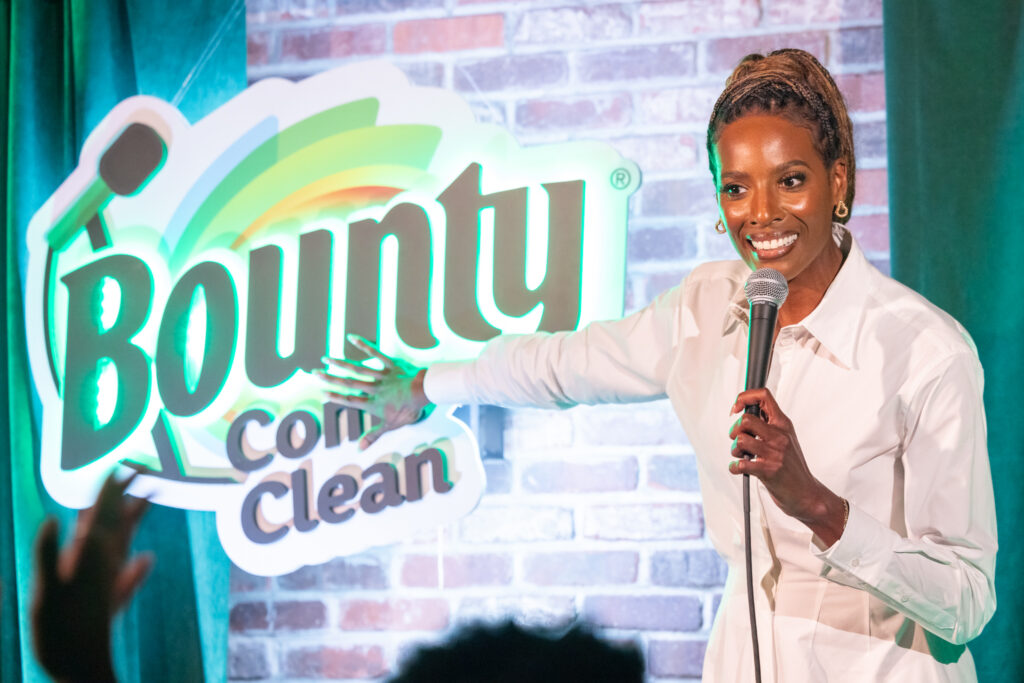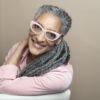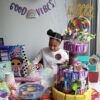Laughter is universal. Whether you’re Black or white, young, or old, Catholic or atheist – none of those things matter when it comes to the things that we find funny. Zainab Johnson, a former teacher-turned-stand-up-comedian, actor, and writer, knows firsthand the power of laughter and how it’s one of the common threads that ties society together.
Growing up in Harlem, as one of 13 siblings in a Black Muslim family, Johnson shares her unique perspective and experiences through a humorous lens. In fact, she debuted her first one-hour comedy special, Hijabs Off, on Amazon Prime last fall. To say she’s been booked and busy would be an understatement.
Johnson is a regular on Amazon’s original series, Upload, and has made appearances on popular late night TV shows, Late Night with Seth Meyers. If she’s not on the screen, you can find her hitting the stage as a regular at renowned comedy clubs around the country.
I recently caught up with the quick-witted comic who boasts nearly a half million Instagram followers, and talked about her recent partnership with Bounty, Saturday morning cleaning routines, Moms Mabley, and more.

Photo courtesy of Bounty
Check out our Q&A below:
Brown Girl Gumbo: You recently headlined a show in New York City in collaboration with Bounty called “Come Clean,” tell me about that partnership.
Zainab Johnson: “My partnership with Bounty was to highlight and create content that shows the cleaning standards for black moms. I think that there are some universal truths that we all know just as black women by way of our black moms when it comes to cleaning. I think Bounty was trying to highlight that and I was very happy to partner with them because I genuinely use Bounty and, I have a black mom.”
BGG: Speaking of cleaning, do you recall those Saturday morning household cleaning routines while growing up?
ZJ: “Yeah, of course. I recall cleaning Saturday morning house cleaning. It’s ingrained in you. You can’t forget it! I was never woken up on a Saturday morning by my mom or an alarm clock. I just heard ‘Sweet Thing’ by Chaka Khan coming from the stereo. I just knew that meant, ‘Oh, it’s time to wake up and clean!
Everybody has their house song. I remember my ex-boyfriend knew every word of Anita Baker’s songs, I would be like, ‘How do you know this? You’re too young to know Anita Baker. He was like, ‘Every Saturday morning that’s the first thing I heard with my mom. When it was time to clean, my mom would be playing Anita Baker.”
BGG: It makes me wonder what non-Black people do on Saturday mornings. Are they blasting music too while deep cleaning?
ZJ: Honestly, they’re probably using Bounty as well. Now, what they got playing in the background and who’s in the house, that ain’t none of our business!
BGG: I know you used to be a teacher. When did you know that comedy was your true passion?
ZJ: Yes, I was a teacher. However, at the time when I was a teacher, I had no idea that I would ever be a standup comedian. I think that I knew after the first open mic I ever did. I wasn’t a comedian, performer, or an aspiring artist. It just was like one day I said, ‘I’m going to try standup.’ It’s like I had the thought that day, went out and tried it that day, and I got confirmation that day. I was like, ‘Oh, this is what I’m going to be doing.’ And I got that confirmation because not that, I was good, but it was a good experience for my first time. It just felt more right than anything else had ever felt.
BGG: What was your motivation to get up there and do it if you had never performed before? What made you say, ‘I’m just going to get up here and try this?’
ZJ: I used to watch a lot of standup comedy and really enjoy it when I was in college and girls would be like, ‘Let’s go to a bar or club,’ and I used to say, ‘I’m going to a comedy show.’ I just enjoyed watching it so much and I really love laughing.
Then in my more adult life, I started being around a lot of comedians. A lot of comedians were like my closest friends. I was at comedy clubs a lot and I started working for someone who’s booking comedians. And so, through that experience I was seeing a lot of the same thing. I was seeing few women in this space and even fewer black women in this space. And I don’t think that that was at the front of my mind, but I think that it just was something happening subconsciously. I was aware of something lacking.
BGG: Tell me more.
ZJ: Right around the time that I did it [open mic], I was not only working for a booker, but I also had been going out to comedy shows with a more intentional approach, meaning I was really looking to find and appreciate good talent.
I started being very analytical when I watched performers and analytical in a way of rewriting their jokes in my mind. I would understand, I would go through the process of understanding why a joke worked, why one person could get away with saying something and making it funny and another person maybe couldn’t.
It was just all twirling around in my head. And that day that I went to the open mic, I quit my job. Like I said, I was working for a booker, and I knew I didn’t move to L.A to work for someone. Not in that capacity. If I were going to just work a standard job or more traditional job, then I’ll just use my degree. I’ll teach. I loved teaching and there’s a certain level of performance to that too. And I mean, I say this humbly, but I was a cool teacher.
BGG: Do you feel like as a former teacher that you’re still teaching people but now it’s through comedy?
ZJ: Yeah, sure. I’d like to believe that, but the humblest part of me is saying that somebody else can say that.
As a comedian, I expose things through my personal experiences. So, I guess I would say I expose rather than teach. I expose people to my experience and my experience is reminiscent of a lot of experiences that go untold. And so, I strive to do that via my comedy.
BGG: Who were some of the people that you admired before you took that leap of faith and got up there on the stage?
ZJ: I always admired Wanda Sykes, but she felt far removed. She’s somebody on TV, but the people I was seeing in clubs every week were comedians like Bill Burr, Keith Robinson, Dean Edwards, and even Tiffany Haddish. She was the go-to Black girl on the L.A scene before Girls Trip. I used to just see a lot of people in the clubs. These funny people would be killing the clubs, killing the stage, but they don’t necessarily have the major or mainstream exposure. Also, I obviously admired the bigger people like the Dave Chappelle’s and those who we all love.
I’ll never forget, years ago when I first started stand-up, I watched a documentary on Mom’s Mabley produced by Wanda Sykes. I don’t think I’d ever heard of her before, but I knew how interesting and good that documentary was because I was at my mom’s house and younger siblings watched it with me. At the time they were 19, 22, and 6. They all sat down, and we were all fully engaged. It’s like today you ask a lot of people who Mom’s Mabley is, and most can’t tell you.
BGG: Who or what inspires your comedy today?
ZJ: My comedy is completely fueled by my specific experiences. Obviously, I talk about my family a lot because they are a very large part of my existence. My mom is a great source for humor. As much as she walks through life thinking that she’s not, I recognize a lot of her personality is funny. And I do feel like a lot of times when I’m talking about my family, I am punching up, if that makes sense. They’re the joke, but in a very celebratory way.
BGG: That makes sense.
ZJ: I try my best to do that when I’m speaking in any way about the Black experience, the Black family experience, and the Black female experience. Do you get what I’m saying? I try my best to, even if I’m highlighting what is humorous, I am always trying to celebrate. Yes, this is funny, but this is great.
BGG: Who do you turn to when you need a good laugh?
ZJ: When I need a good laugh, I turn to my siblings and my friends because they’re so funny. Also, my comedian friends Will Vince, Keith Robinson, Monica Saunders, Chloe Hilliard, and Sidney Washington. They just make me laugh nonstop. And again, my siblings. That’s who I turn to when I just need nonstop humor. Sometimes I go to them for the deep therapeutic conversations, and it just ends up being so hilarious.”
BGG: What are your thoughts on cancel culture in the comedy space? What is your take on that?
ZJ: I think that comedians may be the last line of free speech. At least we try, but I do think that some people try to use the cloak of comedy to spew awful things or push a boundary. I say a lot of things that people can get on board with, but I’ve also said things that have rocked somebody’s boat.
I feel like my intentions are always good. My intentions are not to be sexist, racist, xenophobic, homophobic, or prejudicial in any way. Those are some people’s intentions and if those are your intentions, then I do believe we have to put you in time out. But I think that if those aren’t your intentions and your intent is to bring levity to something that is a very real thing in our existence, then you should not be canceled. There must be some room for that.
BGG: What’s next for you? What’s in your plans for the upcoming months or year?
ZJ: In the long term I feel like the sky’s the limit. Not to sound cliche, but my mind is like, ‘What God has for me, I don’t even know it’s if it’s graded in my vision.‘
In the next few months and weeks, I’m wrapping up the last season of Upload. I’m also working on my next hour special. Additionally, I am in development for two shows that are my own creative ideas. So, in a broad way, I’m just continuing to grow, continuing to be fun, as well as being a true and authentic representation for people who identify the same as me. I’m also continuing to expose the people who identify differently than me. I want them to be like, ‘Oh, I like that as well. That’s different than me, but I like that as well and want to open up my experience and existence to more of this.’
*This interview has been edited for length and clarity.




Speak Your Mind